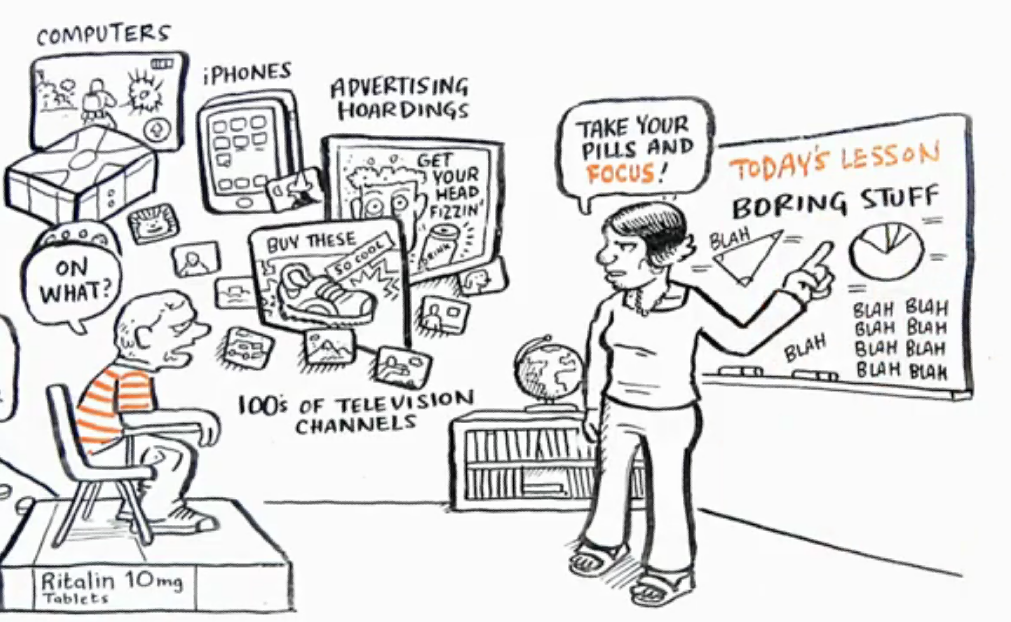Sir Ken Robinson outlines the problems of a linear standardized education. Its time to throw the old model out and revolutionize education towards a model that builds an environment where children may explore their talents, find their passions, and are given room to flourish.
Bring on the Learning Revolution Ted Talk – Notable Excerpts
…education, in a way, dislocates very many people from their natural talents. And human resources are like natural resources; they’re often buried deep. You have to go looking for them, they’re not just lying around on the surface. You have to create the circumstances where they show themselves. And you might imagine education would be the way that happens, but too often it’s not.
Every education system in the world is being reformed at the moment and it’s not enough. Reform is no use anymore, because that’s simply improving a broken model. What we need — and the word’s been used many times during the course of the past few days — is not evolution, but a revolution in education. This has to be transformed into something else.
One of the real challenges is to innovate fundamentally in education. Innovation is hard because it means doing something that people don’t find very easy, for the most part. It means challenging what we take for granted, things that we think are obvious. The great problem for reform or transformation is the tyranny of common sense; things that people think, “Well, it can’t be done any other way because that’s the way it’s done.”
I came across a great quote recently from Abraham Lincoln…”The dogmas of the quiet past are inadequate to the stormy present. The occasion is piled high with difficulty, and we must rise with the occasion.” I love that. Not rise to it, rise with it. “As our case is new, so we must think anew and act anew. We must disenthrall ourselves, and then we shall save our country.”
…many of our ideas have been formed, not to meet the circumstances of this century, but to cope with the circumstances of previous centuries. But our minds are still hypnotized by them, and we have to disenthrall ourselves of some of them.
One of them is the idea of linearity: that it starts here and you go through a track and if you do everything right, you will end up set for the rest of your life. Everybody who’s spoken at TED has told us implicitly, or sometimes explicitly, a different story: that life is not linear; it’s organic. We create our lives symbiotically as we explore our talents in relation to the circumstances they help to create for us.
…human communities depend upon a diversity of talent, not a singular conception of ability…At the heart of the challenge is to reconstitute our sense of ability and of intelligence. This linearity thing is a problem.
The other big issue is conformity. We have built our education systems on the model of fast food…there are two models of quality assurance in catering. One is fast food, where everything is standardized. The other are things like Zagat and Michelin restaurants, where everything is not standardized, they’re customized to local circumstances.
…we have sold ourselves into a fast food model of education, and it’s impoverishing our spirit and our energies as much as fast food is depleting our physical bodies.
…human talent is tremendously diverse. People have very different aptitudes…But it’s not only about that. It’s about passion. Often, people are good at things they don’t really care for. It’s about passion, and what excites our spirit and our energy.
You know this, if you’re doing something you love, an hour feels like five minutes. If you’re doing something that doesn’t resonate with your spirit, five minutes feels like an hour. And the reason so many people are opting out of education is because it doesn’t feed their spirit, it doesn’t feed their energy or their passion.
We have to move to a model that is based more on principles of agriculture. We have to recognize that human flourishing is not a mechanical process; it’s an organic process. And you cannot predict the outcome of human development. All you can do, like a farmer, is create the conditions under which they will begin to flourish.
There’s been a lot of talk about dreams over the course of this few days…I wanted to read you a quick, very short poem from W. B. Yeats…”Had I the heavens’ embroidered cloths, Enwrought with gold and silver light, The blue and the dim and the dark cloths Of night and light and the half-light, I would spread the cloths under your feet: But I, being poor, have only my dreams; I have spread my dreams under your feet; Tread softly because you tread on my dreams.” And every day, everywhere, our children spread their dreams beneath our feet. And we should tread softly.


Comments are closed.